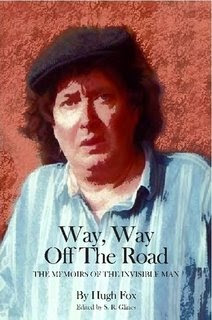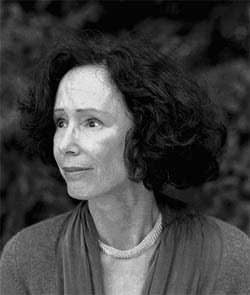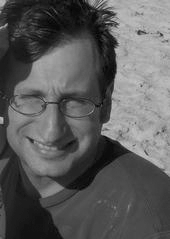
SHWA 19: A Note on Hugh Fox --- from: http://davidcaddy.blogspot.com
Hugh Fox, one of the co-founders of the Committee of Small Magazine Editors & Publishers (COSMEP) network, has been an abiding and colourful presence on the small press scene for forty years. COSMEP was founded at Berkeley in November 1968, by a generation born in the Thirties, to foster the post-Beat boom in small press publishing. Closely linked to Sixties counter-culture, the founders of COSMEP were interested in breaking down social, psychological, personal and literary barriers. Hugh Fox has continued on this route unabated, combining an academic career with his small press activity. He wrote an acclaimed book on pre-Columbian religion and edited, Ghost Dance, an international quarterly of experimental poetry from 1968 until 1995 that featured Latin American and outsider poets. He is a poet of exuberant mental states and shifting voices. He has published more than one hundred books of poetry and is one of those poets that is forever looking and moving forward. The direct opposite of, for example, the English poet, Philip Larkin, who published only five books and was predominantly introspective. Widely read with an inquisitive mind, Fox’s poetry exudes the spirit of opening the doors of perception and its arc of development is outwards towards the new.
His work jumps from perception to perception, allusion to allusion, drawing upon vast knowledge in literature, history, archaeology, anthropology and languages and experience. Like Charles Olson, Fox works on a grand scale, seeking out a universality and global and or comparative perspective. Fox, though, is more divergent than Olson and works in shorter units. He is a beguiling poet, continually experimenting with different techniques and personae and using cultural, historical, autobiographical and linguistic references to open out meaning and ways of being.
It is this constant quest of moving forward, onwards to the next technical problem, book, chapbook, and a desire to publish with independent presses that he shares with his English contemporaries associated with The English Intelligencer newsletter started in 1968 and the Association of Little Presses, founded in 1966.
Quoting from Fox’s own autobiographical comment, he writes:
‘After attending grammar school with the Irish nuns at Saint Francis de Paulo school in Chicago, and then high school with the Christian Brothers of Ireland (not just the regular Christian Brothers), the pre-med and medicine at Loyola University in Chicago, then a switch to English, a Ph.D. in American Literature from the Univ. of Illinois and marriage to a Peruvian who was mostly Indian and getting involved with the mythologies of the ancient world, making discoveries no one had ever dreamed of before (like discovering Phoenician writing all over the pottery and ruins of the Mochica Indians in Peru and the Yopi Indians in Mexico, discovering Sumerian writing on pots in ancient Bolivia), and then becoming a Jew after I discovered that the ‘Czech’ grandmother who had raised me was really Jewish too ...’ (Hugh Fox – Defiance Higganum Hill Books 2007 page 88) Note the emphasis upon discovery and the movement from one discipline to another, from one religion to another. His second wife was from Kansas and his third is a Brazilian MD. From the same autobiographical note, we read ‘When in Spain or Latin America he is usually identified as an Argentinean.’
His memoir, Way, Way Off The Road (Ibbetson Street Press 2006) sheds light on what he terms the invisible post-Beat hippie generation of poets. It’s full of vignettes of poets and literary figures and criss-crosses over time and place in a collage of stories.
Fox is fascinated with the roots of individual identity and language that is backed up by research in Peru, Columbia, Chile, Mexico and Trinidad, a facility in several languages and the first critical studies of Charles Bukowski and Lyn Lifshin. He was attracted to Bukowski’s non-academic, non-Latinate English and its lack of pretension and Lifshin’s sense of isolation that he links to her father’s hidden Jewishness. (Way, Way Off The Road pp 10, 101-6, 128-134) He admires both for their artistic integrity and yet sees their outsider status as masks. The same perspective can be applied to Fox’s poetry. For he also plays the outsider card and similarly employs masks. The most notable of which is his alter ego, Connie Fox, which he played out in dress and print. (See Connie Fox’s Blood Cocoon: Selected Poems Presa Press 2005) The creation and writing of an active female self with a life and history can be seen as an extension or unfurling of the creative self and a movement against another barrier or plain exhibitionism. Certainly he has remained true to the post-April 1968 Berkeley sensibility of the gypsy poet vagabond and continues his outward journey of discovery and the books continue to appear at a prolific rate.
His Brazilian poems, Finalmente / Finally translated from the Portuguese into English by Glanna Luschei (Solo Press 2007) has been followed by Nunca Mais / Never Again (Cornerstone Press 2008) a series of sequentially numbered first person narratives that places the perceiving self within the living culture of Florianopolis, Brazil. It is a subjective study of the body in flight, crippled and fighting against the ravages of time and the backdrop of a holiday from Michigan to distant relatives.
23
Teresa walking slowly with her cane,
talking about “I…I…I…w…w…would..I…I…
like…to go t…t…t..to…the..b…b…bathroom,”
her son who spoke perfect English last
year yesterday told me (eating coconut
sweets) “I’ve already forgotten everything,”
his sweetheart, Neiva, has a son from another
guy..the commandments here:
1. More coffee,
2. More butterflies,
3. Papaya,
4. News on the TV,
5. Clothes,
6. Free time,
7. Sea,
8. Hills,
9. Grilled beef,
10. Eternities.
The movement here from pathos to bathos gives extra depth and humour to a sequence that effortlessly sprawls across intercultural relations into philosophical
probing. Fox positions words to employ their full meaning in poems and in so doing makes easy poems more complex and brings in a wider range of reference, as here:
16
Lovers Day tomorrow – the TV shows
kisses,
kisses,
kisses,
men lifting women over to beds, me
castrated like a monkey from another planet,
trying to learn how to be a human being
in the middle of assassinated sons, drugs,
rifles, cocaine, cocaine, cocaine,
communion / the body of Christ in
the twenty-first century
Coca = Herb
and herbas are natural products of the earth.
The tone of casual reportage begins to unwind towards the end of the sequence.
54
The church channel on TV, hypnotizing,
Hail Mary to the computers, hail to
to the TV with a thousand channels,
hail to the cost of gas going up, hail
to the motorcycles that go like bullets
and use less gas, hail to inflation
lowering the salaries and raising prices,
hail to all the faces in the world together,
no differences because of color or language,
or the name of the tribe, waiting for Jesus
to come back again, and for the difference
between heaven and earth to disappear
forever. Amen.
‘Hail’ here of course can be pellets of frozen rain, to greet enthusiastically and to acclaim as the reader knows and thus the tone of the poem is both enhanced and potentially mocked. As the news and films of violence escalates, the narrator becomes more isolated by thoughts of mortality and this eventually leads to a poetic implosion.
64
My poetry itself begins to
undo itself, the intellectual-
creative landscape undoing
itself and the philosophical
richness of the present moment
here re-becoming the great
emptiness of my life (almost
over) there.
This reinforces the Bukowskian theme of the body with teasing comic puns in the bracketed ‘almost’ and line broken ‘over’ coalescing thoughts of mortality into the kind of self-pity that Bukowski would have ridiculed. Fox employs a knowing self that seeks to embrace the world as fully as possible and calls upon the full gamut of emotional responses within a continually evolving exploration of identity.
***David Caddy Poet, Writer, Critic. Caddy edits the international literary magazine, Tears in the Fence. My most recent books are Man in Black (Penned In The Margins 2007), London: City of Words (Blue Island 2006) and The Willy Poems (Clamp Down Press 2004). I also write the occasional episode of Middle Ditch, the internet drama serial.
* To order a copy send $19 ( includes postage and handling ) to Doug Holder 25 School St. Somerville, Mass. 02143

























































